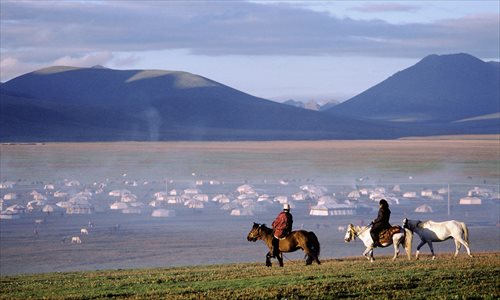‘The Tibet Code’

Complete set of The Tibet Code Photo: Courtesy of Shanghai Dook Publishing Co, Ltd

As films based on popular novels occupy this summer's cinemas, the fever to adapt Chinese bestsellers has spread to Hollywood.
The vice president of China Film Group Zhang Qiang post on his Weibo that a director of US TV drama Prison Break will turn the first four books of Ghost Blows Out the Light (Gui Chui Deng) series into movies.
Meanwhile, it was reported that the copyright to adapt volume one of The Tibet Code - there are 10 books in all - has been sold for over 10 million yuan ($1.6 million). That figure towers over that paid to adapt Wolf Totem, which went for 1 million yuan ($160,000) in 2003.
The CEO of DreamWorks Animation, Jeffrey Katzenberg, announced in April of this year that he wants to turn The Tibet Code into a series of epic adventures. The project, which is aimed firmly at the booming local market, will be a coproduction with China Film Group from its Chinese venture, Oriental DreamWorks.
Encyclopedia of Tibet
The Tibet Code's author, He Ma, was ranked in the Chinese writers rich list in 2008, 2011 and 2012 after the series was published. When he started to write the story in 2005, he did not include so many connections with Tibet. The original concept was to write a short story about an adventure chasing a legendary Tibetan mastiff. But as the plot moved on, great knowledge about the local customs, religion and history became necessary.
Hua Nan, chairman of Shanghai Dook Publishing Co, Ltd, noticed He Ma's story in 2008 and began the process of publishing it. At that time, He had finished writing the first two books and had most of the ideas for the rest of the story.
Though the story gained only about 30,000 views at that time, Hua believed that it showed great potential and took the risk to sign He Ma, which turned out to be a very smart decision.
Hua concludes there are four reasons for The Tibet Code's success: First, the story is so easy to read that any reader could understand it without prior background knowledge; second, the good tempo of the plot keeps readers attracted; third, the 10-book series has a long cycle for publishing, which helps the books remain a hot topic; and last but not least, the content was adjusted during composition to add a lot of specific Tibetan knowledge.
He Ma was a full time medical staff worker when he was writing the three-million-word story. All the information about Tibet came from his daily accumulation.
Hua told the Global Times that they broke the original limit of being regarded as an adventure novel, and called it an encyclopedia of Tibet.
"The fixed number of readers of adventure novels in China is about two million, and most of them are loyal to some certain type of adventure stories. But by adjusting The Tibet Code into a book focused on Tibetan culture, we have much wider range of readers," said Hua.
Hua introduced that over 20 million people have been to Tibet for travel, according to statistics from the local tourist administration. Hua shows his ambition to grab all the people from home and abroad who are interested in Tibetan culture as potential readers of The Tibet Code.
Potential blockbuster
Katzenberg gave high praise to the series. "When I read the series I thought 'Wow! This is just a blockbuster story,'" he said in a conference during the Beijing Film Festival this year, "There's no secondary agenda. The Tibet Code has all the makings of a world-class, quality, blockbuster franchise."
He shows his confidence by making it a successful live action movie layered with a mysterious religion and rich historic background.
Katzenberg said on the sidelines of the 2013 Fortune Global Forum that, "It could be for China, like the Indiana Jones and The Da Vinci Code films."
Actually, some foreign movie investors found He Ma by his blog in 2010 and negotiated with him on the copyright of TV series and movie, with a price that was 10 times higher than the offer given to the author by China Film Foundation. But He Ma's father insisted that the story be in the hands of a State-owned film company to avoid it going to some producers who have different political views with China.
The contract was signed on April 28, 2012. He Ma's father revealed in his blog that the movie series will start this year. The 10-volume story has been divided into six movies, and the investment for the first one has exceeded $130 million, 60 percent of which is offered by China Film Group while 40 percent comes from Hollywood.
Hua has never been surprised by the strong confidence shown by the famous Hollywood producer. To avoid the quota of importing movies to China, many Hollywood movies especially produce the version to put in Chinese theaters with a few Chinese actors (such as Fan Bingbing and Wang Xueqi in Iron Man 3) or with some scenery shot in Chinese mainland (such as Mission Impossible 3) to turn the movie into an international coproduction to earn more at the Chinese box office.
"But it is difficult for them to contain real Chinese elements, so it is better for them to search for popular original Chinese scripts," said Hua.
He Ma's father wrote in his blog how he perceives the film type: "The Tibet Code could be an action film for its adventure line, and could be a culture and scenery film for the complicated relationships among its main characters, which have a Tibetan background, and it could be a suspense film for its quest to find out the truth, so we asked for the best team to create the film series."
The plots involving a British expedition team, the historical discovery of the Maya civilization and Hitler's connection to Tibet also bring the content closer to Western readers.
Hua said it was hard to export Chinese culture for audiences in different cultural backgrounds unless there is a "cultural tag" that has already become popular in the West, just like kung fu.
"This time, Tibet is the cultural tag for The Tibet Code series."